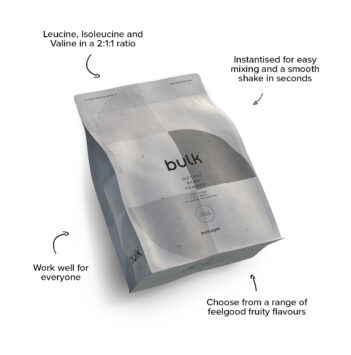If you’re into working out or going to the gym, you’ll have heard about BCAAs. With some insights from Simon Jurkiw, Product Director at Bulk™, we’ll be diving into when to take BCAAs, but also their composition, their benefits and who should take them.
What are BCAAs?
BCAAs, or Branched-Chain Amino Acids, are a collection of three essential amino acids (EAAs). An essential amino acid is an amino acid that the body can’t produce itself, so it must be obtained through the diet or through supplementation. Hence, essential. BCAAs contain leucine, isoleucine and valine, all of which are essential amino acids.
“In terms of BCAA products, they tend to be created in a 2:1:1 ratio”, informs Simon, “So if you had a 10g serving of BCAAs, that would be 5g of leucine, 2.5g of Isoleucine and 2.5g of valine.
You can get different variations, from 4:1:1 to 8:1:1. All with leucine in higher quantities. So BCAA is a leucine dominant supplement.”
What do BCAAs do?
The main advantage of BCAAs is that they give you additional protein during your training session. They are also high in leucine, which plays a key role in muscle protein synthesis.
“From a scientific viewpoint, there really isn’t a huge benefit in taking BCAAs above and beyond just hitting your daily protein requirements”, says Simon.
“There is some research on muscle soreness and on endurance, but mostly, BCAAs help to reach your total daily protein requirements and are a convenient way to have protein during a training session.”
By taking BCAAs, you are better equipped for building muscle mass, stimulating protein synthesis and reducing muscle breakdown. BCAAs are also useful for calorie-restricted diets. Easy to mix with water, a refreshing BCAA drink is an enjoyable, efficient way to increase your protein intake.
Now, let’s take a quick look at research for the benefits of BCAAs.
Reducing muscle soreness
As part of a balanced diet, BCAAs may help to relieve muscle soreness. A range of studies trialling placebos against BCAAs have suggested that they may be useful for improving muscle soreness after bouts of exercise. However, within the studies there were discrepancies over timing of supplementation and range of exercises (1, 2, 3).
Readily accessible and easy to supplement
BCAAs are accessible. By upping your protein intake or taking a BCAA-based supplement, you can easily increase your intake. BCAA supplements come in a range of fruity flavours, so there’s something to suit everyone. It’s an easy way to get a steady supply of protein throughout the day.
Summary:
- BCAAs help to reach your total daily protein requirements.
- BCAAs are an easy and enjoyable way to have protein during a training session.
- BCAAs support normal muscle function.
When to take BCAAs
You can take BCAAs anytime during the day, including during your work-out. With their lighter, fruity flavours, it’s ideal to drink throughout the day – pre-workout or post-workout. If you’re a fan of fruit juice or squash, it’s a dream.
“Probably the number one reason people use BCAAs is to sip on intra-workout”, says Simon. “BCAAs tend to be a fruity, easy-to-drink beverage. Something like a dairy or vegan shake isn’t great to sip on during training, so BCAAs provide a great alternative for that.”
An intra-workout amino blend helps to provide your muscles with what it needs at the most crucial stage. Studies suggest that supplementing with BCAAs during intense exercise could maintain muscle tissue leading to a longer period of exercise before fatigue sets in (4).
BCAAs and cardio
BCAAs exert an anabolic response, meaning the rate of protein synthesis could exceed the rate of protein breakdown. A higher rate of muscle breakdown (muscle loss) occurs if you participate in a lot of cardio and are in a calorie deficit. Therefore, taking BCAAs during your workout could help to counteract this.
How much BCAAs should you take?
In addition to the BCAAs you eat in your diet, 5g of BCAA is a good amount to supplement with. Like a lot of supplementation, consistency is key. Many studies that have looked into the efficacy of BCAAs noted that the body’s response increases with prolonged use. You need to give your body time to absorb and adapt.
That said, the best way to make sure you’re getting enough BCAAs is through your diet. By eating protein-rich wholefoods, you consume a decent amount of BCAAs. Supplementation helps ensure intake is consistently high, but this is not an excuse to deprioritise your regular diet.
Who should take BCAAs?
Most active people would benefit from supplementing with BCAAs. If you run long distances, go to the gym, or train hard in any way, then supplementing with BCAAs is a great way to fill any gaps within your nutrition, contributing to your daily protein intake.
BCAAs are found in a variety of wholefoods, however it’s important to note foods naturally high in BCAAs tend to be animal-based products. You can still obtain a decent amount from plant-based sources. Soya beans, for example, are an excellent source of BCAAs. But like many supplements, BCAAs add an element of convenience that allows you to be more consistent with your intake.
Frequently asked questions
Are BCAAs worth it?
“The main disadvantage of BCAAs is that, unlike supplements such as creatine, there’s a lack of clear, specific research on the benefits”, says Simon.
However, BCAAs are an important aspect of our diets that support normal bodily functions. Supplementation helps you be consistent with your intake. So if you’re serious about your training and want to take your supplementation to that next level, BCAAs are a great option.
How much BCAA should you take per day?
The sweet spot for BCAA supplementation is 5g per serving. Depending on your needs, you can supplement with BCAAs with one to three servings a day.
Should you take BCAA every day?
Yes, BCAAs can be taken every day to supplement your diet. They can be great for anyone who needs to get extra amino acids or ensure a steady supply. Studies have previously shown benefits in the prolonged usage of BCAAs.
Is it OK to take BCAA and protein powder together?
Yes, you can take BCAA powder and protein powder together. Protein powder already contains a certain amount of BCAAs, but it’s fine to have extra servings on top.
Why take BCAAs when there are BCAAs in whey protein?
The BCAA in whey protein takes some time to be digested, broken down and separated from the whey and everything else in it. Therefore, it takes a while for the body to obtain the BCAA. A supplement means the EAAs are absorbed more quickly.
Some people drink BCAA instead of whey protein during workouts. It can be unpleasant to drink thicker, creamy shakes products during an intense succession, so the lighter, fruity aspect of BCAAs is often preferable.
Should you take BCAA before or after a workout?
Either. The great thing about BCAAs is that you can use them at any point during the day, whether that be pre-workout, intra-workout or post-workout. This makes it easy to incorporate BCAAs into your routine.
Summary
So, when should you take BCAAs? As Simon mentioned earlier in the piece, BCAAs are great supplements to sip on during a workout. Being light and fruity, they’re a great alternative to creamy protein shakes. They’re also good to drink during the day, especially for those on calorie-restricted diets. Generally, BCAAs are a great way to meet your daily protein goals.
We believe in encouraging everyone to find their passion for exercise. For more fitness content check out @bulk for recipes, ambassador workouts and gym tips and join our community of fitness lovers and foodies.

















